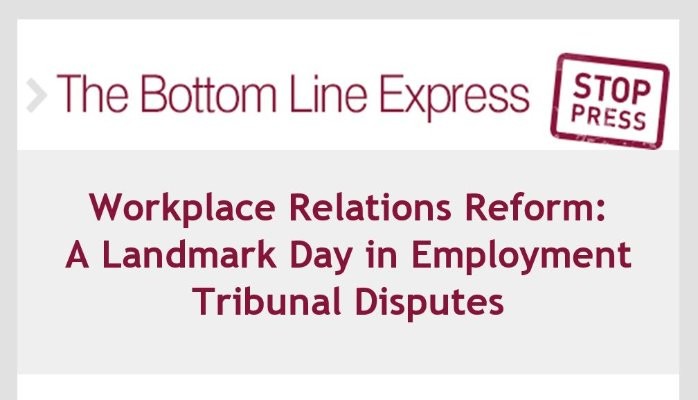
Workplace Relations Reform
The 1st October 2015 marked a milestone day for employment tribunal claims in Ireland. As of the 1st October 2015, the newly formed Workplace Relations Commission (WRC) will now be the first port of call for employment claims, thereby absorbing all such work from the LRC, EAT and Equality Tribunal. The Labour Court will then be a one-stop shop for all appeals. This streamlined system, according to Ministers Bruton and Nash, “will result in 20% reduction in staff and 10% reduction in budgets” and from Peninsula’s point of view it will lead to far less time spent by employers defending tribunal claims.
An Outdated System
This reform was necessary because the existing system had become outdated and cumbersome for employee, employer and representatives alike. By way of example, we can look at the hypothetical scenario of an employee who has lodged a Terms of Employment claim, an Organisation of Working Time claim, an Unfair Dismissal claim and an Equality Claim. Under the old system:
- The Terms of Employment claim would be heard at the and any appeal at the EAT.
- The Working Time claim would be heard at the LRC and any appeal at the Labour Court
- The employee could elect for the Unfair Dismissal to be heard at the EAT and any appeal would then go to the Circuit Court.
- The Equality claim would be heard at the Equality Tribunal and any appeal at the Labour Court
Under the new system, however:
- All of those claims will be heard by the WRC and any appeal will go to the Labour Court.
In summary, under the old system the four claims could result in the employer having to attend as many as 8 different hearings in front of 5 different bodies. Under the new system, the employer would only have to attend 2 different hearings in front of 2 bodies.
Workplace Relations Reform - the Key Points
The following are the key points for employers to take from the reform process-
- All employment claims lodged on or after 01 October 2015 will be heard by the WRC with all appeals going to the Labour Court.
- Any claims lodged to the EAT prior to 01 October 2015 will still be heard by the EAT under the old system. However, once the EAT clears its caseload it will then be dissolved.
- Any claims lodged to the LRC or Equality Tribunal, whether before or after 01 October 2015, will now be heard by the WRC.
- There will be no right of appeal to the Circuit Court under the new system. If any party wishes to appeal a Labour Court decision then it will be to the High Court on a point of law only. It will not be enough to simply disagree with the Labour Court’s outcome; in order to successfully appeal, the Labour Court must have made an error in applying the law.
- WRC hearings will not be conducted in public and decisions published online will not disclose the names of the employer or employee. Labour Court hearings, party names, and decisions will be made public however.
- Under the new system, the WRC or Labour Court can request that certain claims be heard by means of written submission only. However, neither party will be obliged to agree to this request.
- All employment claims under the new system must be taken within 6 months of the alleged incident. If the employee has failed to do so then the deadline may be extended to 12 months where the employee had a reasonable cause for the delay.
- If an employer fails to comply with a decision to award compensation then this will be deemed an offence which, on summary conviction, can result in a fine up to €5000 or imprisonment up to 6 months, or both.
The new system places a heavy focus on mediation. If the WRC feels that a claim can be resolved by mediation, and the employer and employee agree, then it will be referred to a mediation officer. Any resolution reached through mediation will be legally binding.
For an in-depth analysis of this reform and what it means for employers please click here